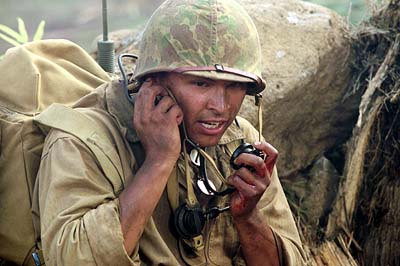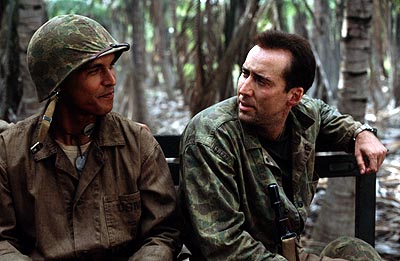

It's a shame when a movie like Windtalkers takes a fascinating subject with the potential for a superb movie, and turns it into another piece of Hollywood action junk. Windtalkers refers to the Navajo code talkers of World War II. They were a little known but crucial group of soldiers who relayed information in the Navajo language over the radio. In addition to being in another language, the code talkers used code words for terms like tank and artillery. The Japanese were never able to crack the code, since the Navajo language was unlike anything they had ever heard. This is a war movie, and it uses every single war movie cliche by the time the end credits role. The first big mistake is the same mistake that Hollywood always makes, presumably to increase demographics. Instead of focusing on the Private Ben Yahzee, the Navajo code talker, it splits time between Yahzee and the much less interesting Sergeant Joe Enders, Yahzee's protector. The secret of the code is vital to American interests, so each code talker has, in essence, a bodyguard. This bodyguard must protect the code at all costs, which means killing the code talker, if necessary.
Enders (Nicholas Cage, Captain Corelli's Mandolin, The Family Man) is recovering, physically and mentally from a grueling battle where he watched many of his men die. He should not be back on the battlefield because of an inner ear injury, but he befriended a nurse (Frances O'Connor, The Importance of Being Earnest, A.I., and incidentally, the only female in the cast), who helped him get back. Still, he is inwardly dealing with the fact that he survived and his men did not. He eagerly takes the assignment of protecting Yahzee (Adam Beach, Joe Dirt, The Art of Woo), a bright young recruit. Yahzee's exuberance for patriotism is the antithesis of Enders' war weary persona. Yahzee also has no real taste of combat, so the initial gore of the battles horrifies him. Code talker Charles Whitehorse (Roger Willie) and his bodyguard Sergeant Peter Henderson (Christian Slater, Zoolander, 3000 Miles to Graceland) are another pair in the same unit. The Marines ship them to Saipan, and Windtalkers chronicles the brutal battle for the island.
Brutal is the key word. Like every recent war movie, Windtalkers ups the depiction of battle violence to visceral levels. Bullets fly through soldiers, broken limbs flail in agony, and blood flies everywhere. Under the direction of action master John Woo (Mission: Impossible II, Face/Off), it approaches okay levels, but this is not Woo at his best. The violence is most likely there to cover the many deficiencies of John Rice (The Calling, Blown Away) and Joe Batteer's (Blown Away, Chasers) script. There are an abundance of characters, but aside from Yahzee and Whitehorse, none are very interesting. Most of them are standard military hawk stereotypes, especially Noah Emmerich (Frequency, Love & Sex), who plays the typical racist whose interaction with the Native Americans slowly changes his views. Even Enders, who has a lot of screen time, seems has no real depth except that he is a jerk. The movie becomes surprisingly boring watching the unit try to slowly cover ground over Saipan.
The best scenes in Windtalkers are the ones that are on screen the least. They involve either training for the code, or the actual transmission of the code. Yahzee and Whitehorse are also the most interesting characters and Beach and Willie are capable actors, but have nothing to do. There are some mildly powerful scenes involving Yahzee combating racism within his own company, but the resolution is too clean. It's also good seeing a positive, non-stereotypical portrayal of a Native American on the big screen, but it feels sometimes as if Woo, probably fearing a backlash, made Yahzee and Whitehorse a little too noble. Windtalkers is a decent war movie, but the problem with that is that aside from the Navajo, there is nothing really new. There is one missed opportunity after another. Instead of focusing on the proper characters, the story spreads itself thinly, and includes many extraneous people. Then, it doesn't delve deeply enough into anybody. The result is a watered-down version of what could be a great story that does no justice to either the viewer or the Navajo.